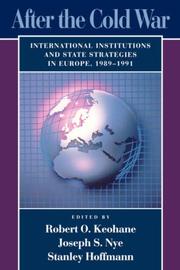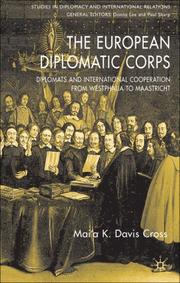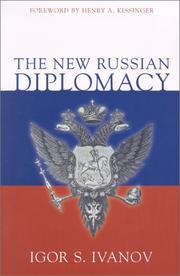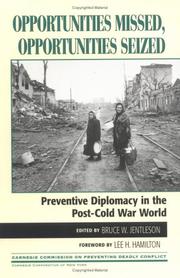| Listing 1 - 10 of 33 | << page >> |
Sort by
|
Book
ISBN: 9029075112 Year: 2004 Publisher: Amsterdam Meulenhoff
Abstract | Keywords | Export | Availability | Bookmark
 Loading...
Loading...Choose an application
- Reference Manager
- EndNote
- RefWorks (Direct export to RefWorks)
vredesproblematiek --- koude oorlog --- nieuwe wereldorde --- International relations. Foreign policy --- America --- Europe --- #SBIB:327.6H00 --- #SBIB:327.6H40 --- Internationale en diplomatieke relaties: algemeen --- Internationale en diplomatieke relaties: periode na de Koude Oorlog / Val van de Muur --- Geschiedenis --- Europa --- Politiek --- Buitenlandse politiek --- Politieke geschiedenis --- Crisis --- Cultuur --- Geneeskunde --- Techniek (wetenschap) --- Atlas --- Museum --- Maatschappij --- Film --- Internationale en diplomatieke relaties: algemeen. --- Internationale en diplomatieke relaties: periode na de Koude Oorlog / Val van de Muur. --- internationale politiek --- veiligheidsbeleid

ISBN: 0674008642 0674008634 Year: 1993 Publisher: Cambridge, Mass. Harvard University Press
Abstract | Keywords | Export | Availability | Bookmark
 Loading...
Loading...Choose an application
- Reference Manager
- EndNote
- RefWorks (Direct export to RefWorks)
International groups --- Europe --- International agencies --- Organisations internationales --- Politics and government --- Politique et gouvernement --- #SBIB:327.6H40 --- #SBIB:012.IEB --- -International agencies --- -Associations, International --- IGOs (Intergovernmental organizations) --- Institutions, International --- Intergovernmental organizations --- International administration --- International associations --- International governmental organizations --- International institutions --- International organizations --- International unions --- Organizations, International --- Specialized agencies of the United Nations --- International cooperation --- Interorganizational relations --- Non-state actors (International relations) --- International organization --- Internationale en diplomatieke relaties: periode na de Koude Oorlog / Val van de Muur --- -Internationale en diplomatieke relaties: periode na de Koude Oorlog / Val van de Muur --- 1989 --- -Europe - Politics and government - 1989 --- -Europe --- -International groups --- Europe - Politics and government - 1989-
Book
ISBN: 2717841784 9782717841787 Year: 2001 Publisher: Paris : Economica,
Abstract | Keywords | Export | Availability | Bookmark
 Loading...
Loading...Choose an application
- Reference Manager
- EndNote
- RefWorks (Direct export to RefWorks)
World politics --- International relations --- Politique mondiale --- Relations internationales --- History --- Histoire --- International relations. --- #SBIB:327.6H40 --- Coexistence --- Foreign affairs --- Foreign policy --- Foreign relations --- Global governance --- Interdependence of nations --- International affairs --- Peaceful coexistence --- World order --- National security --- Sovereignty --- Internationale en diplomatieke relaties: periode na de Koude Oorlog / Val van de Muur --- International Relations --- Diplomacy --- Internationale politiek --- Wereldpolitiek --- Internationale politiek. --- Wereldpolitiek. --- World politics - 1989 --- -World politics
Book
ISSN: 10177566 ISBN: 9789291981144 9291981141 Year: 2007 Volume: no. 103 Publisher: Paris Institute for Security Studies
Abstract | Keywords | Export | Availability | Bookmark
 Loading...
Loading...Choose an application
- Reference Manager
- EndNote
- RefWorks (Direct export to RefWorks)
The attacks of September 11 2001 spectacularly demonstrated that America’s main security challenges did not stem from traditional power rivalries but rather from ‘grey areas’, failed or badly governed states which are breeding grounds for extremism. Today the emphasis has shifted from focusing on relations between states to acting directly on states themselves, so as to pre-empt the growth of terrorism, arms proliferation, genocide, civil wars etc. After the concept of the ‘global war on terror’, President George W. Bush put forward his ‘freedom agenda’ aiming to promote democracy as a response to the security challenges facing the world, in particular in the Middle East. But overthrowing tyrants and holding elections is not enough to create a stable and well-governed democracy and can even, in some cases, complicate matters, as events between 2003 and 2005 in Iraq, Afghanistan, the Palestinian Authority and Egypt have shown. This is where ‘transformational diplomacy’, the concept inaug-urated by Condoleezza Rice in early 2006, comes in. Basically this consists in working with the partners of the United States with a view to ‘build and sustain democratic, well-governed states that will respond to the needs of their people and conduct themselves responsibly in the international system.’ To enable this to happen, it is first of all American diplomacy which must transform itself, so as to become less ‘analytical’ and more operational, characterised by direct involvement in foreign societies rather than just being restricted to the realm of foreign policy. This Chaillot Paper explores the scope and limits of this ‘transformative’ action: is the realist paradigm, that of interpower rivalries, really no longer relevant ? Can diplomats transform themselves into active promoters of good governance ? Are other countries ready to accept them in this role, or will they accuse them of interference ? Can transformational diplomacy really change the world ?
Security, International --- Sécurité internationale --- United States --- Etats-Unis --- Foreign relations --- Relations extérieures --- #SBIB:327.5H00 --- #SBIB:327.6H40 --- #SBIB:327H15 --- Strategie en vredesonderzoek: algemeen --- Internationale en diplomatieke relaties: periode na de Koude Oorlog / Val van de Muur --- Buitenlandse politiek: Noord-Amerika --- Sécurité internationale --- Relations extérieures
Book
ISBN: 9780262622189 0262622181 Year: 2008 Publisher: Cambridge MIT press
Abstract | Keywords | Export | Availability | Bookmark
 Loading...
Loading...Choose an application
- Reference Manager
- EndNote
- RefWorks (Direct export to RefWorks)
Balance of power --- World politics --- Forecasting --- #SBIB:327.6H40 --- Internationale en diplomatieke relaties: periode na de Koude Oorlog / Val van de Muur --- World politics. --- Forecasting. --- Colonialism --- Global politics --- International politics --- Political history --- Political science --- World history --- Eastern question --- Geopolitics --- International organization --- International relations --- Power, Balance of --- Power politics --- Political realism --- Balance of power - Forecasting
Book
ISBN: 9780415732284 041573228X 9781315726342 9781317536628 9781317536635 9781138716728 Year: 2016 Publisher: London ; New York : Routledge,
Abstract | Keywords | Export | Availability | Bookmark
 Loading...
Loading...Choose an application
- Reference Manager
- EndNote
- RefWorks (Direct export to RefWorks)
Diplomates --- Diplomatie --- Union européenne --- Relations extérieures --- Europe --- Unité --- #SBIB:327.7H233 --- #SBIB:327.6H40 --- Europese Unie: externe relaties, buitenlands- en defensiebeleid (ook WEU) --- Internationale en diplomatieke relaties: periode na de Koude Oorlog / Val van de Muur --- Diplomats --- European Union countries --- Foreign relations administration. --- Diplomatie. --- Unité. --- Relations extérieures. --- Union européenne --- Relations extérieures. --- Unité.

ISBN: 9780230500754 0230500757 Year: 2006 Publisher: Houndmills ; New York Palgrave Macmillan
Abstract | Keywords | Export | Availability | Bookmark
 Loading...
Loading...Choose an application
- Reference Manager
- EndNote
- RefWorks (Direct export to RefWorks)
Are diplomats agents of international co-operation or transmission belts for states? Traditional theories of international relations seriously underestimate the ability of diplomats as a collective to impact outcomes in the international environment beyond initial state preferences. 'The European Diplomatic Corps' argues that diplomats comprise a transnational network of experts or 'epistemic community' which has been critical in determining co-operation or non-co-operation among European states. The cases considered are the congresses of Westphalia (1648), Berlin (1878), Paris (1919) and Maastricht (1992).
DiplomatsHistory. --- Diplomacy --- Diplomats --- #SBIB:327.6H20 --- #SBIB:327.6H30 --- #SBIB:327.6H40 --- #SBIB:94H0 --- Statesmen --- History --- Internationale en diplomatieke relaties: periode 1815-1945: algemeen --- Internationale en diplomatieke relaties: periode 1945 - 1989 --- Internationale en diplomatieke relaties: periode na de Koude Oorlog / Val van de Muur --- Geschiedenis van Europa: algemeen --- International relations. Foreign policy --- History.

ISBN: 0815744986 9780815744986 Year: 2002 Publisher: Washington, D.C. The Nixon Center ; Brookings Institution Press
Abstract | Keywords | Export | Availability | Bookmark
 Loading...
Loading...Choose an application
- Reference Manager
- EndNote
- RefWorks (Direct export to RefWorks)
International economic relations --- Russian Federation --- Russia (Federation) --- Russie --- Foreign relations. --- Relations extérieures --- Foreign relations --- #SBIB:328H262 --- #SBIB:327H13 --- #SBIB:327.6H40 --- Instellingen en beleid: Rusland en het GOS --- Buitenlandse politiek: U.S.S.R. / GOS / Russische Federatie --- Internationale en diplomatieke relaties: periode na de Koude Oorlog / Val van de Muur --- -Russia (Federation) --- Russia & Former Soviet Republics --- Regions & Countries - Europe --- History & Archaeology --- -Foreign relations --- Russia --- Relations extérieures --- Russia (Federation) - Foreign relations
Book
ISBN: 2271051320 9782271051325 Year: 1994 Publisher: Paris CNRS
Abstract | Keywords | Export | Availability | Bookmark
 Loading...
Loading...Choose an application
- Reference Manager
- EndNote
- RefWorks (Direct export to RefWorks)
Diplomatic negotiations in international disputes --- Mediation, International --- Négociations diplomatiques dans les conflits internationaux --- Médiation internationale --- 341.7 --- Diplomacy --- #SBIB:004.GIFT --- #SBIB:327.6H00 --- #SBIB:327.6H40 --- Negotiations in international disputes --- Pacific settlement of international disputes --- History --- International relations --- Diplomatiek recht --- Internationale en diplomatieke relaties: algemeen --- Internationale en diplomatieke relaties: periode na de Koude Oorlog / Val van de Muur --- Diplomacy. --- Diplomatic negotiations in international disputes. --- 341.7 Diplomatiek recht --- Négociations diplomatiques dans les conflits internationaux --- Médiation internationale

ISBN: 0847685594 Year: 1999 Volume: *2 Publisher: Lanham, Md. New York Oxford Rowman & Littlefield
Abstract | Keywords | Export | Availability | Bookmark
 Loading...
Loading...Choose an application
- Reference Manager
- EndNote
- RefWorks (Direct export to RefWorks)
Coexistence --- Coëxistence pacifique --- Diplomacy --- Diplomatie --- Foreign affairs --- Foreign policy --- Interdependence of nations --- International relations --- Internationale betrekkingen --- Ordre mondial --- Peaceful coexistence --- Relations internationales --- Vreedzame coëxistentie --- Wereldorde --- World order --- Diplomacy. --- International relations. --- #SBIB:001.AANKOOP --- #SBIB:327.5H20 --- #SBIB:327.6H40 --- Foreign relations --- Global governance --- International affairs --- Vredesonderzoek: algemeen --- Internationale en diplomatieke relaties: periode na de Koude Oorlog / Val van de Muur --- National security --- Sovereignty --- World politics --- History
| Listing 1 - 10 of 33 | << page >> |
Sort by
|

 Search
Search Feedback
Feedback About
About Help
Help News
News